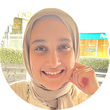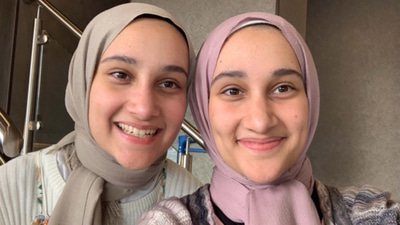- OT
- Life in practice
- Career development
- “I enjoyed seeing another side of optometry”
Students in...
“I enjoyed seeing another side of optometry”
Optometry student, Alia Hathaf, on the lessons she has learnt from observing special assessment clinics and how it has inspired an interest in research


Alia Hathaf
05 September 2022
Meet the student
University: Cardiff University
Year of study: Final year
Why I want to become an optometrist: I wanted to study optometry to make a difference to society. Optometry for me was the perfect balance in providing science-based clinical practice, along with one-to-one patient interaction and care.
In this new series, OT asked student and pre-registration optometrists to share their stories of work experience – from shadowing days, to volunteering and internships – to find out more about what can be learned from these opportunities, and the variety of pathways that optometry can lead to. To follow along with the series, read more on OT here.
Final year students at Cardiff University have timetabled sessions throughout the academic year in the paediatric and special assessment clinics. The special assessment clinics provide eye care to both children and adults with special needs and intellectual disabilities. This was one of many reasons why I decided to study optometry at Cardiff University, and it has been an eye-opening experience.
This has always been an area of interest of mine. However, I had never considered the challenges faced by vulnerable individuals in accessing the eye care they deserve. Dr Margaret Woodhouse and the special assessment clinic has inspired me to consider a future in research and a career that involves providing eye care to those who are vulnerable and have special needs.

Ultimately this experience has made me appreciate that no two patients are the same and it’s essential that our sight tests are kept engaging and fun. I learnt how to use my time wisely in order to gain the most information out of the sight test.
I enjoyed seeing another side of optometry as well as interacting with the patients. The experiences in the clinics have been extremely insightful and valuable and I learnt things that I will adopt once I’m a practising optometrist. For example, I learnt that if a patient is in a wheelchair, it’s really important to allow them to see the room first, before wheeling them backwards into a space, so that they’re calm and aware of their surroundings.
Take every opportunity that life presents you
Adapting to the patient
One challenging aspect is that you’ve got to always adapt and it’s important to always assess the patient’s body language. For example, a child with nystagmus came in and it was evident the patient was more comfortable and relaxed in a dimly lit room, as she was sensitive to bright light. Therefore, most of the examination was done with the lights dimly lit. I also had the experience of practising ophthalmoscopy on a child with nystagmus, recognising the challenges of examining a patient with involuntary eye movements. I learnt that staying calm and patient sets the tone for the entire sight test – first impressions are everything.This experience in the special assessment clinics has inspired me and, after qualifying, I want to specialise in paediatrics and special assessment. The dream would be to run my own specialised clinic, that has specifically-designed sensory rooms and play. I also want to go into research and explore accommodation in patients with Down syndrome. I would further love to one day go into teaching and inspire the next generation of optometrists to consider paediatrics and special assessment as a specialty. I’ve had a wonderful experience and I want to give back to the community. The sky’s the limit.
The dream would be to run my own specialised clinic, that has specifically-designed sensory rooms and play
The future of optometry is bright, with higher qualifications in glaucoma, medical retina and low vision. It’s important that the next generation of optometrists are inspired and we should do this by providing students with further information on the various opportunities that are available to them and signposting them to appropriate organisations, depending on their interests in research, paediatrics, domiciliary, hospital optometry, etc. Students must be aware of the higher qualifications that are available and accredited by the College, and the importance of upskilling. Ultimately it’s all in the patient’s best interest.
I really enjoyed and have learnt a great deal from attending the special assessment clinics. Ultimately, I learnt the importance of effective communication with short and concise instructions and the value of patient-practitioner interactions. By creating a relaxing and playful environment, the patient is calmer and more information can be obtained from the sight test. I also learnt that you’ve got to be quick to perform certain techniques before the patient loses concentration. I can’t thank Dr Maggie Woodhouse enough for the experience and her commitment in allowing these clinics to take place – she’s an inspiration.
I would tell other students...
The setting, with Dr Maggie Woodhouse
Placement: Special Assessment ClinicLocation: Cardiff University Eye Clinic
How many placements or shadowing opportunities do you offer per year and for what duration?
Dr Maggie Woodhouse (MW): My clinic runs one day per week throughout the year, with the exception of annual leave. During term-time, our undergraduate students are timetabled to attend the clinic, so visiting is limited. Outside of term-time, I am happy to accommodate visitors to any clinic, so this would be about 25 weeks per year. I can sometimes accommodate two visitors, but I think people get more out of it if they are alone. In addition to pre-reg and qualified optometrists, my visitors include specialist teachers, habilitation officers, social workers, paediatricians, and trainee ophthalmologists.Why does the Special Assessment Clinic take on student optometrists?
MW: Standard teaching in university courses covers the provision of eye care for able adults and older children. My clinic is essential to raise students' awareness that there are other groups of people who cannot participate with conventional eye examination techniques. My clinics expose students to the alternative ways of carrying out an eye examination.
Advertisement

Comments (0)
You must be logged in to join the discussion. Log in